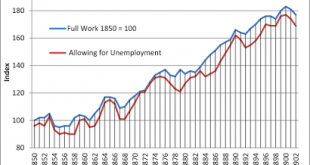For those interested in the Argentinean economy, and that can understand Portuguese, I'm teaching a virtual course on the Rise and Fall of Argentina with my friend Paulo Gala. Some teasers are available here. Below the first class. [embedded content] Btw, my suggestion is that basically there's no fall, if the economy never rose in the first place.
Read More »Paul Bairoch on the Industrial Revolution, the Third World and Imperialism in World History
To continue from my post here, Paul Bairoch’s book Economics and World History: Myths and Paradoxes (New York and London, 1993) further analyses Western colonialism, the industrial revolution, and non-Western versus Western imperialism.Did British imperialism from the 15th to the early 19th century play a major – or indeed necessary – role in triggering the British industrial revolution?The fact is that, economically speaking, the British empire was not very big in the early modern period and...
Read More »Paul Bairoch on the Industrial Revolution, Imperialism and Capitalism
The economic historian Paul Bairoch (1930–1999) subjected some Marxist myths about Western capitalism and imperialism to critical scrutiny in his now classic book Economics and World History: Myths and Paradoxes (New York and London, 1993).First, was the Western industrial revolution dependent on energy from the Third World?Bairoch (1993: 59) notes that right up until the post-WWII era the West was almost completely self-sufficient in energy, and as late as the 1930s much of the developed...
Read More »Engels’ Pause: A Cause of Marx and Engels’ Hasty and False Generalisations about Capitalism
The expression “Engels’ Pause” was coined by Robert C. Allen and refers to the period of real wage stagnation or low real wage growth in Britain in the early 19th century from about 1800 to 1840, even when real per capita GDP was rising in an historically unprecedented manner. You can see the “pause” in the graph of historical British real wages and per capita GDP per worker here.First, it is important to note that some economic historians have challenged the data on GDP and real wages in...
Read More » Heterodox
Heterodox

